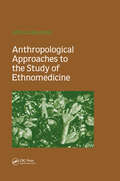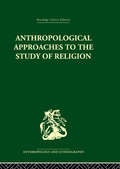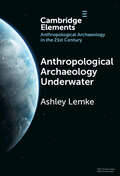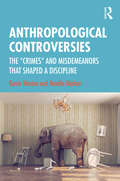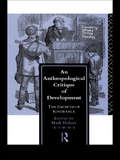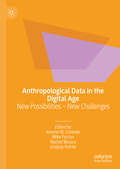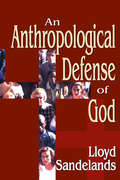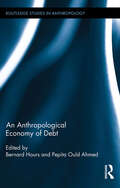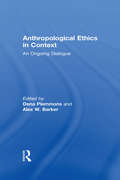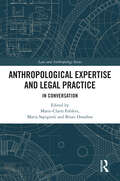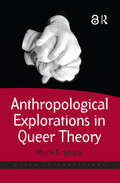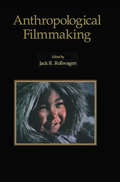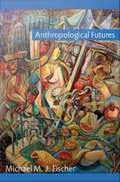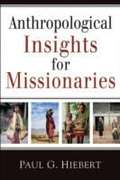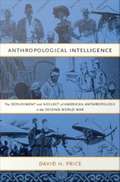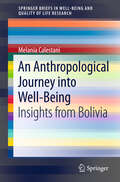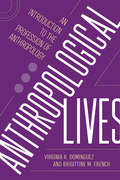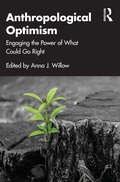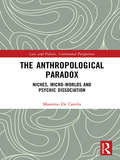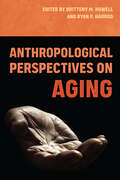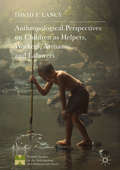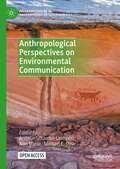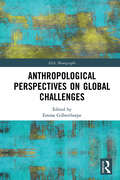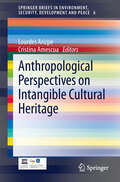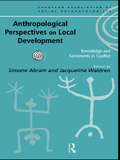- Table View
- List View
Anthropological Approaches to the Study of Ethnomedicine
by Mark NichterFirst Published in 1992. The reader of this volume will see how a decade of new work has remade ethnomedicine into one of the livelier and more promising domains of anthropology. Nicthter's encompassing redefinition of the relationship of ethnomedicine to medical anthropology and his critical comments that introduce each chapter are bound to provoke discussion and response over the years to come. - Arthur Kleinman, MD Harvard Medical School.
Anthropological Approaches to the Study of Religion
by Michael BantonAs the basic questions of social structure were elucidated there came a quickening of interest among social anthropologists in the study of religion. Chapters in this book include: · Religion as a Cultural System (Clifford Geertz) · Colour Classification in Ndembu Religion (Victor W. Turner) · Religion: Problems of Definition and Explanation (Melford E. Spiro) · Fathers, Elders and Ghosts in Edo Religion (R.E. Bradbury) · Territorial Groupings and Relgion among the Iraqw (Edward H. Winter). First published in 1966.
Anthropological Archaeology Underwater (Elements in Anthropological Archaeology in the 21st Century)
by Ashley LemkeAnthropological archaeology underwater is a new field. What type of research is this and how do anthropologists go about it? When most people hear the phrase 'underwater archaeology', they think of shipwrecks and dramatic images of lost ships at sea, but the underwater archaeological record is vast. In addition to historic vessels, water preserves some of the oldest landscapes on the planet. While archaeologists are interested in the past, those working underwater apply the latest technologies to provide fresh understandings about ancient human behaviour. Underwater environments provide preservation that is unmatched on land and therefore the data collected is novel – providing information about human lifeways and creating a picture of the past we would otherwise never see. This Element will explore the world of anthropological archaeology underwater, focusing on submerged sites, and review the techniques, data, and theoretical perspectives which are offering new insights into the human story.
Anthropological Controversies: The “Crimes” and Misdemeanors that Shaped a Discipline
by Gavin Weston Natalie DjohariThis book uses controversies as a gateway through which to explore the origins, ethics, key moments, and people in the history of anthropology. It draws on a variety of cases including complicity in "human zoos", Malinowski’s diaries, and the Human Terrain System to explore how anthropological controversies act as a driving force for change, how they offer a window into the history of and research practice in the discipline, and how they might frame wider debates such as those around reflexivity, cultural relativism, and the politics of representation. The volume provokes discussion about research ethics and practice with tangible examples where gray areas are brought into sharp relief. The controversies examined in the book all involve moral or practical ambiguities that offer an opportunity for students to engage with the debate and the dilemmas faced by anthropologists, both in relation to the specific incidents covered and to the problems posed more generally due to the intimate and political implications of ethnographic research.
An Anthropological Critique of Development: The Growth of Ignorance (Eidos (european Inter-university Development Opportunities Study Group) Ser.)
by Mark HobartQuestioning the utopian image of western knowledge as a uniquely successful achievement in its application to economic and social development, this provocative volume, the latest in the EIDOS series, argues that it is unacceptable to dismiss problems encountered by development projects as the inadequate implementation of knowledge. Rather, it suggests that failures stem from the constitution of knowledge and its object.By focussing on the ways in which agency in development is attributed to experts, thereby turning previously active participants into passive subjects or ignorant objects, the contributors claim that the hidden agenda to the aims of educating and improving the lives of those in the undeveloped world falls little short of perpetuating ignorance.
Anthropological Data in the Digital Age: New Possibilities – New Challenges
by Jerome W. Crowder Mike Fortun Rachel Besara Lindsay PoirierFor more than two decades, anthropologists have wrestled with new digital technologies and their impacts on how their data are collected, managed, and ultimately presented. Anthropological Data in the Digital Age compiles a range of academics in anthropology and the information sciences, archivists, and librarians to offer in-depth discussions of the issues raised by digital scholarship. The volume covers the technical aspects of data management—retrieval, metadata, dissemination, presentation, and preservation—while at once engaging with case studies written by cultural anthropologists and archaeologists returning from the field to grapple with the implications of producing data digitally. Concluding with thoughts on the new considerations and ethics of digital data, Anthropological Data in the Digital Age is a multi-faceted meditation on anthropological practice in a technologically mediated world.
An Anthropological Defense of God
by Lloyd E. SandelandsAnthropology--the study of man--is unlike every other study because humans are its subject. And because we are its subject we cannot manage the philosophic and emotional distance necessary to see clearly. Unable to stand apart from ourselves to comprehend our own truth, we are compelled to assume things about ourselves that we cannot prove. In a word, anthropology begins in faith. Lloyd Sandelands approaches the anthropological quest for God by comparing the faiths of modern social science and of the Christian church.Sandelands describes the social scientific faith articulated by Hume, Kant, Rousseau, Schopenhauer among others, as an imagined state of nature that sees the individual as solitary, self-sufficient, and contented. By contrast, the Christian faith unites us as male and female persons in one flesh before God. The challenge in the author's view is to decide which faith to build our lives upon. Sandelands poses questions about the basic terms of human study--what is a person, and what is society?--and how do the different metaphysics of science and Church lead to different anthropologies?A worthwhile anthropology must address the questions of what constitutes human freedom, desire, and the nature of the good. Comparing the answers given by science and by the church, he finds that the one paradoxically denies freedom, denies want, and denies the good, while the other affirms freedom, affirms want, and affirms the good. Between these two anthropologies he finds there is but one true study of man.A companion to Sandelands' Man and Nature in God, his most recent book, An Anthropological Defense of God attempts to establish that an anthropology in God succeeds where an anthropology in science fails. Such success is measured not only by its ideas and findings about man, but even more by its wisdom in teaching us how to live.
An Anthropological Economy of Debt (Routledge Studies in Anthropology #21)
by Pepita Ould Ahmed Bernard HoursDebt is often thought of as a mere economic variable governed by a simplistic mechanical logic, ignoring its other facets. Whose debt, and debt of what exactly? This volume analyzes debt as a political and social construct, with a multiplicity of purposes and agents. All of these are vectors of meanings that are highly diverse, and of subtle distinctions; they show that debt is a transverse phenomenon, cutting across spaces that are not merely economic but also domestic, social and political. Each contributor takes a fresh view of the subject, dealing with debt at a different time, in a different society, on a different scale of observation. By adopting a determinedly interdisciplinary approach, the authors reveal in the phenomenon of debt a diversity of social and gendered determinants that amount in some cases to domination, allegiance or slavery, and in others to solidarity and emancipation. Debt is at one and the same time shared, imposed, political and gendered.
Anthropological Ethics in Context: An Ongoing Dialogue
by Alex W Barker Dena PlemmonsThis volume examines general ethical principles and controversies in the social sciences by looking specifically at the recent three-year revision process to the American Anthropological Association’s code of ethics. The book’s contributors were members of the task force that undertook that revision and thus have first-hand knowledge of the debates, compromises, and areas of consensus involved in shaping any organization’s ethical vision. The book-reflects the broad diversity of opinion, approach, and practice within anthropology and the social sciences;-develops ethical principles that reflect core values rather than the latest ethical controversies;-crafts clear, broad statements, increasing the likelihood that the ethical code will be a meaningful part of the daily discourse of practicing anthropologists;-develops the ethical code as a living document, or a process of experience and debate, subject to future revision and amplification;-provides explanation through internet links and other resources, ensuring that the finished product be relevant and vibrant.
Anthropological Expertise and Legal Practice: In Conversation (Law and Anthropology)
by Marie-Claire Foblets, Maria Sapignoli and Brian DonahoeThis book draws on concrete cases of collaboration between anthropologists and legal practitioners to critically assess the use of anthropological expertise in a variety of legal contexts from the point of view of the anthropologist as well as of the decision-maker or legal practitioner. The contributions, several of which are co-authored by anthropologist–legal practitioner tandems, deal with the roles of and relationships between anthropologists and legal professionals, which are often collaborative, interdisciplinary, and complementary. Such interactions go far beyond courts and litigation into areas of law that might be called ‘social justice activism’. They also entail close collaboration with the people –often subjects of violence and dispossession –with whom the anthropologists and legal practitioners are working. The aim of this collection is to draw on past experiences to come up with practical methodological suggestions for facilitating this interaction and collaboration and for enhancing the efficacy of the use of anthropological expertise in legal contexts. Explicitly designed to bridge the gap between theory and practice, and between scholarship and practical application, the book will appeal to scholars and researchers engaged in anthropology, legal anthropology, socio-legal studies, and asylum and migration law. It will also be of interest to legal practitioners and applied social scientists, who can glean valuable lessons regarding the challenges and rewards of genuine collaboration between legal practitioners and social scientists.
Anthropological Explorations in Queer Theory (Queer Interventions)
by Mark GrahamAnthropological Explorations in Queer Theory offers a wide ranging fusion of queer theory with anthropological theory, shifting away from the discussion of gender categories and identities that have often constituted a central concern of queer theory and instead exploring the queer elements of contexts in which they are not normally apparent. Engaging with a number of apparently 'non-sexual' topics, including embodiment and fieldwork, regimes of value, gifts and commodities, diversity discourses, biological essentialisms, intersectionality, the philosophy of Bergson and Deleuze, and the representation of heterosexuality in popular culture, this book moves to discuss central concerns of contemporary anthropology, drawing on both the latest anthropological research as well as classic theories. In broadening the field of queer anthropology and opening queer theory to a number of new themes, both empirical and theoretical, Anthropological Explorations in Queer Theory will appeal not only to anthropologists and queer theorists, but also to geographers and sociologists concerned with questions of ontology, materiality and gender and sexuality.
Anthropological Filmmaking: Anthropological Perspectives on the Production of Film and Video for General Public Audiences (Visual Anthropology)
by Jack R. RollwagenFirst Published in 1988. Visual Anthropology is a book series devoted to the illumination of the human condition through a systematic examination of all that is made to be seen. It is our intention to demonstrate the value of an anthropological approach to the study of the visual and pictorial world. The anthropological filmmaker, just like the ethnographer, must be content to present something about a dynamic process at a particular moment in time regardless of the fact that all of the variables are constantly in flux. The purpose of this work is to make available a collection of articles by individuals who are both anthropologists and filmmakers.
Anthropological Futures
by Michael M. J. FischerIn Anthropological Futures, Michael M. J. Fischer explores the uses of anthropology as a mode of philosophical inquiry, an evolving academic discipline, and a means for explicating the complex and shifting interweaving of human bonds and social interactions on a global level. Through linked essays, which are both speculative and experimental, Fischer seeks to break new ground for anthropology by illuminating the field's broad analytical capacity and its attentiveness to emergent cultural systems. Fischer is particularly concerned with cultural anthropology's interactions with science studies, and throughout the book he investigates how emerging knowledge formations in molecular biology, environmental studies, computer science, and bioengineering are transforming some of anthropology's key concepts including nature, culture, personhood, and the body. In an essay on culture, he uses the science studies paradigm of "experimental systems" to consider how the social scientific notion of culture has evolved as an analytical tool since the nineteenth century. Charting anthropology's role in understanding and analyzing the production of knowledge within the sciences since the 1990s, he highlights anthropology's aptitude for tracing the transnational collaborations and multisited networks that constitute contemporary scientific practice. Fischer investigates changing ideas about cultural inscription on the human body in a world where genetic engineering, robotics, and cybernetics are constantly redefining our understanding of biology. In the final essay, Fischer turns to Kant's philosophical anthropology to reassess the object of study for contemporary anthropology and to reassert the field's primacy for answering the largest questions about human beings, societies, culture, and our interactions with the world around us. In Anthropological Futures, Fischer continues to advance what Clifford Geertz, in reviewing Fischer's earlier book Emergent Forms of Life and the Anthropological Voice, called "a broad new agenda for cultural description and political critique. "
Anthropological Insights for Missionaries
by Paul G. HiebertExpert anthropologist shows missionaries how to better understand the people they serve and their historical and cultural settings.
Anthropological Intelligence: The Deployment and Neglect of American Anthropology in the Second World War
by David H. PriceBy the time the United States officially entered World War II, more than half of American anthropologists were using their professional knowledge and skills to advance the war effort. The range of their war-related work was extraordinary. They helped gather military intelligence, pinpointed possible social weaknesses in enemy nations, and contributed to the army's regional Pocket Guide booklets. They worked for dozens of government agencies, including the Office of Strategic Services (OSS) and the Office of War Information. At a moment when social scientists are once again being asked to assist in military and intelligence work, David H. Price examines anthropologists' little-known contributions to the Second World War. Anthropological Intelligence is based on interviews with anthropologists as well as extensive archival research involving many Freedom of Information Act requests. Price looks at the role played by the two primary U. S. anthropological organizations, the American Anthropological Association and the Society for Applied Anthropology (which was formed in 1941), in facilitating the application of anthropological methods to the problems of war. He chronicles specific projects undertaken on behalf of government agencies, including an analysis of the social effects of postwar migration, the design and implementation of OSS counterinsurgency campaigns, and the study of Japanese social structures to help tailor American propaganda efforts. Price discusses anthropologists' work in internment camps, their collection of intelligence in Central and South America for the FBI's Special Intelligence Service, and their help forming foreign language programs to assist soldiers and intelligence agents. Evaluating the ethical implications of anthropological contributions to World War II, Price suggests that by the time the Cold War began, the profession had set a dangerous precedent regarding what it would be willing to do on behalf of the U. S. government.
An Anthropological Journey into Well-Being: Insights from Bolivia (SpringerBriefs in Well-Being and Quality of Life Research)
by Melania CalestaniThis volume is a unique contribution to the exploration of a new perspective in the study of well-being, which tries to overcome the quantification bias by creating an account of 'the good life' in a specific place. Rather than numbers, this research focuses on local narratives, emphasising the urgent need to include a wider range of methodological approaches when engaging with well-being. The volume demonstrates through the Bolivian case study the value of qualitative research for well-being studies. It shows the potential to integrate predominant quantitative data with qualitative outcomes, such as those emerging through ethnography. It is aimed at academics, researchers and students in well-being/quality of life studies, as well as audiences in the non-profit, governmental and policy in the non-profit, governmental and policy sectors. The book provides new perspectives in achieving better indicators of well-being and quality-of-life.
Anthropological Lives: An Introduction to the Profession of Anthropology
by Virginia R Dominguez Brigittine M. FrenchAnthropological Lives introduces readers to what it is like to be a professional anthropologist. It focuses on the work anthropologists do, the passions they have, the way that being an anthropologist affects the kind of life they lead. The book draws heavily on the experiences of twenty anthropologists interviewed by Virginia R. Dominguez and Brigittine M. French, as well as on the experiences of the two coauthors. Many different kinds of anthropologists are represented, and the book makes a point of discussing their commonalities as well as their differences. Some of the anthropologists included work in the academy, some work outside the academy, and some work in institutions like museums. Included are cultural anthropologists, linguistic anthropologists, medical anthropologists, biological anthropologists, practicing anthropologists, and anthropological archaeologists. A fascinating look behind the curtain, the stories in Anthropological Lives will inform anyone who has ever wondered what you do with a degree in anthropology. Anthropologists profiled: Leslie Aiello, Lee Baker, João Biehl, Tom Boellstorff, Jacqueline Comito, Shannon Dawdy, Virginia R. Dominguez, T.J. Ferguson, Brigittine French, Agustín Fuentes, Amy Goldenberg, Mary Gray, Sarah Green, Monica Heller, Douglas Hertzler, Ed Liebow, Mariano Perelman, Jeremy Sabloff, Carolyn Sargent, Marilyn Strathern, Nandini Sundar, Alaka Wali.
Anthropological Optimism: Engaging the Power of What Could Go Right
by Anna J. WillowThis book theorizes the roles of optimism in anthropological thinking, research, writing, and practice. It sets out to explore optimism’s origins and implications, its conceptual and practical value, and its capacity to contribute to contemporary anthropological aims. In an era of extensive ecological disruption and social distress, this volume contemplates how an optimistic anthropology can energize the discipline while also contributing to bettering the lives, communities, and environments of those we study. It brings together scholars diverse in background, career stage, and theoretical approach in a collective attempt to comprehend the myriad intersections of anthropology and optimism. The challenges of the COVID-19 pandemic have recently underscored the larger, longer-term catastrophes of climate change, ecosystemic collapse, social injustice, and antipathy toward scientific knowledge and those who produce it. In this context, exceedingly few anthropologists feel comfortable observing and documenting passively while their research communities face unrelenting waves of (un)natural disasters. We need to act. But we also need to hope. Discontent with the state of the world and cultural anthropology’s turn to increasingly positive, future-oriented, and engaged work have converged to unleash a courageously optimistic anthropology. This book is a timely springboard for this impactful and emergent approach.
The Anthropological Paradox: Niches, Micro-worlds and Psychic Dissociation (Law and Politics)
by Massimo De CarolisThis book addresses how the erosion of traditional forms of political association and legal regulation has given rise to a pluralism of "imperfect communities" constantly exposed to the risk of dissolution. These are niches and micro-worlds that are connected through precarious and ambivalent ties. Such a far-reaching transformation affects at one and the same time both our psychic and social identity. The book argues that this phenomenon is linked to the proliferation of new forms of psychic "disorder" – depression, personality disorder, dissociation – typical of hypermodern societies. However, while these can easily turn into genuine disorders, they can also open onto richer forms of identity, more complex than those of the past. Based on this analysis, the book’s main claim is that this dynamic epitomizes a general anthropological paradox – one that has always marked the human animal: humans are bound by their own biological constitution to fend off disorder by drawing the boundaries of artificial niches, and yet they are inclined to expose themselves to unlimited contingency so that they can find a truly suitable environment. Pursuing a novel understanding of the apparent collapse of traditional juridico-political settings, this book makes the case that the emergence of dissociations at several levels – individual, social, political, legal – does not stem from a lack of political imagination. Rather, it is a situation with which humans are inevitably confronted: a perennial tension between the limited and the unlimited, between the desire to take refuge and the desire to cross borders.
Anthropological Perspectives on Aging
by Britteny M. Howell and Ryan P. HarrodAn in-depth and wide-ranging approach to the study of older adults in society Taking a holistic approach to the study of aging, this volume uses biological, archaeological, medical, and cultural perspectives to explore how older adults have functioned in societies around the globe and throughout human history. As the world’s population over 65 years of age continues to increase, this wide-ranging approach fills a growing need for both academics and service professionals in gerontology, geriatrics, and related fields.Case studies from the United States, Tibet, Turkey, China, Nigeria, and Mexico provide examples of the ways age-related changes are influenced by environmental, genetic, sociocultural, and political-economic variables. Taken together, they help explain how the experience of aging varies across time and space. These contributions from noted anthropological scholars examine evolutionary and biological understandings of human aging, the roles of elders in various societies, issues of gender and ageism, and the role of chronic illness and “successful aging” among older adults.This volume highlights how an anthropology of aging can illustrate how older adults adapt to shifting life circumstances and environments, including changes to the ways in which individuals and families care for them. The research in Anthropological Perspectives on Aging can also help researchers, students, and practitioners reach across disciplines to address age discrimination and help improve health outcomes throughout the life course.
Anthropological Perspectives on Children as Helpers, Workers, Artisans, and Laborers (Palgrave Studies on the Anthropology of Childhood and Youth)
by David F. LancyThe study of childhood in academia has been dominated by a mono-cultural or WEIRD (Western, educated, industrialized, rich, and democratic) perspective. Within the field of anthropology, however, a contrasting and more varied view is emerging. While the phenomenon of children as workers is ephemeral in WEIRD society and in the literature on child development, there is ample cross-cultural and historical evidence of children making vital contributions to the family economy. Children's "labor" is of great interest to researchers, but widely treated as extra-cultural--an aberration that must be controlled. Work as a central component in children's lives, development, and identity goes unappreciated. Anthropological Perspectives on Children as Helpers, Workers, Artisans, and Laborers aims to rectify that omission by surveying and synthesizing a robust corpus of material, with particular emphasis on two prominent themes: the processes involved in learning to work and the interaction between ontogeny and children's roles as workers.
Anthropological Perspectives on Environmental Communication (Palgrave Studies in Anthropology of Sustainability)
by Annelie Sjölander-Lindqvist Ivan Murin Michael E. DoveIn the continuous search for sustainability, the exchange of diverse perspectives, assumptions, and values is indispensable to environmental protection. Through anthropological and ethnographic analyses, this collection addresses how interests, values, and ideologies affect dialogue and sustainability work. Drawing on studies from three continents – Europe, North America, and South America – the paradoxes and the plurality of meanings associated with the creation of sustainable futures are explored. The book focuses on how communication practices collide with organizational frameworks, customary practices, livelihoods, and landscape. In so doing, the authors explore the meanings of environmental communication, pushing beyond environmental advocacy rhetoric to emphasize stronger anthropological engagement within communities to achieve more impactful environmental communication practice. Empirically the book’s chapters explore a diverse set of issues, ranging from coastal management in the European north to Native American place naming in Alaska. They further share findings from studies of contaminated land remediation in Sweden, conflicts over water resources in Chile, management of heritage and national parks in Northern Arizona, and cultural transmission in Slovakia.This is an open access book.
Anthropological Perspectives on Global Challenges (ASA Monographs)
by Emma GilberthorpeThis volume offers a snapshot of anthropological perspectives on global challenges. Whilst it could not hope to represent the full scope of anthropological perspectives, those that are presented highlight some of the critical flaws embedded in such an all-encompassing notion. The contributors reveal the possibilities of reimagining the ways in which ‘challenges’ are understood and addressed and demonstrate how a combination of deep understanding of the past and collaboration, cooperation and inclusive dialogue about the future, can improve the chances of positive action. The collection thus not only shows us that perspectives must change, but also how that change might be realised. Whilst the chapters are authored solely by anthropologists, this book is not solely for anthropologists. The book is illustrative of the practical and theoretical insights that anthropology can offer those individuals, teams, and policy- and decision-makers engaged in research, mitigation and/or intervention practices in relation to the global challenges. Beyond academia, it contributes to broader understandings of the challenges we collectively face at this point in time and how we might collectively and effectively address them.
Anthropological Perspectives on Intangible Cultural Heritage (SpringerBriefs in Environment, Security, Development and Peace #6)
by Cristina Amescua Lourdes ArizpeA decade after the approval of the UNESCO 2003 Convention for the Safeguarding of Intangible Cultural Heritage (ICH), the concept has gained wide acceptance at the local, national and international levels. Communities are recognizing and celebrating their Intangible Heritage; governments are devoting important efforts to the construction of national inventories; and anthropologists and professionals from different disciplines are forming a new field of study. The ten chapters of this book include the peer-reviewed papers of the First Planning Meeting of the International Social Science Council's Commission on Research on ICH, which was held at the Centro Regional de Investigaciones Multidisciplinarias (UNAM) in Cuernavaca, Mexico in 2012. The papers are based on fieldwork and direct involvement in assessing and reconceptualizing the outcomes of the UNESCO Convention. The report in Appendix 1 highlights the main points raised during the sessions.
Anthropological Perspectives on Local Development: Knowledge and sentiments in conflict (European Association of Social Anthropologists)
by Simone Abram Jacqueline WaldrenThis collection examines the conflicts and realities of development at a local, empirical level. It provides a series of case studies which illuminate the attitudes and actions of all of those involved in local development schemes. The material is drawn from Southern and Eastern Europe, Asia and Africa. All the contributors use rigorous anthropological methods of analysis to shed light on the place of feelings of personal sentiment and identity in reactions to planned development schemes. In a world where direct action and public protest are routine responses to local development schemes, they show how protesters, developers and politicians often hold very different fundamental views about the environment, society, government and development which go beyond partisan economic and political interests.
